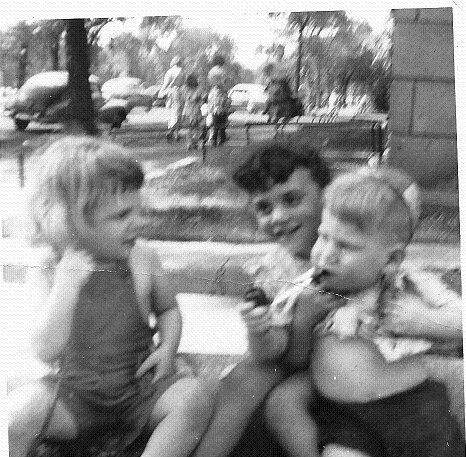As a kid growing up in the 1960’s I was a Democrat because I didn’t know better. It had been schooled into me that Republicans were only for rich people and believed in war which was in their opinion good for the economy. It didn’t make a difference since I couldn’t vote.
The first time I took notice of politics was when we road home in a school bus from Orchestra Hall on Michigan Avenue back to our school in the Austin neighborhood on Chicago’s Far West Side. We had just been treated to seats up in the rafters watching and listening to a matinee presentation put on by the Chicago Symphony Orchestra. This was around the same time Leonard Bernstein was doing television shows dedicated to the same purpose and they were quite popular.
On the forty-five minute ride home due west we rode through neighborhoods with signs on front lawns or taped to windows that either read ‘Go All the Way With JFK’ (John F. Kennedy) or ‘For the Future’ (Richard Nixon). My buddy Perry sat next to me and he made a point of telling me for whom I should be but it did not resonate. When it came down to it, Kennedy made more sense because he was better looking and didn’t look mean. Besides, I had a kid’s version of Kennedy’s book Profiles in Courage or was aware of it so I had somewhat of a sophisticated approach to my choice.
I recall being fascinated on election night watching the news coverage and Walter Cronkite explaining about all the sophisticated computer equipment in the room that was making loud noises in the background.
He said that with the equipment, he would be able to predict who won the election within a couple of hours after the polls closed. In those days, they did not make predictions on East Coast electoral votes until all the states had officially closed down the voting. There was still a sense on the part of the media in playing fair and not trying to discourage West Coast voters in wasting their ballots on a loser.
I liked watching war movies on television but in real life preferred to be a passive bystander although not a conscientious objector. My simple philosophy was ‘leave me out of it’. Besides, I wore glasses due to depth perception problems and double vision as well as had flat feet. I inherited these from Ma.
By the time 1969 came around, I was not yet seventeen and hardly a member of the pot smoking peace movement. Heck, I choked whenever someone smoking a cigarette was within fifteen feet of me. Didn’t have long hair because the high school administration frowned upon it and besides I was not out to make a statement. Did, though, grow a beard which looking back on it was ridiculous as at best it was Solzhenitsyn-like. And you needed a magnifying glass to see the accompanying mustache up close.
During the summer of 1970, after graduating high school, a kind of rash or impetuous thing overcame me. I invited a female classmate to go a movie, a quasi-date. I don’t recall if I even paid for her admission ticket. Wasn’t really that much interested in her romantically- at least, I didn’t think so. I knew her as far back as kindergarten. Anyway, we agreed to meet at the theater and saw Mash. At the time, it was a very risque comedy, totally irreverent, making fun of actions taking place during the Korean War.
The movie had little to do about the 1950 police action in Korea. It was more about the nascent anti-war attitude during the height of the Viet Nam era. There were several things disturbing about the plot- it made fun of suicide, presumed that all married military personnel were playfully cheating on their spouses back home and that all soldiers were against the war. The actors seemed to have haircuts that were more popular after the 1964 Beatles Invasion than the 1950’s crew cuts they should have worn. The dialogue was more late 1960’s than Eisenhower era. It was a distorted political statement. And it helped turn me off to the anti-war cause. Yet, I went through the 1970’s with a “can’t we all get along” attitude mostly because I was hoping to butter up the “man†or basically get on somebody’s good side who would help improve my economic condition.
It wasn’t until the 1980’s that the conservative approach to politics appealed. When Ronald Reagan ascended to his Presidency I finally felt that the voice of reason and a pragmatic approach to an American lifestyle would finally direct the nation back to our collective senses.
The schism that divides America has always been there. Hey, we even had a civil war, remember? So, why is everyone so worked up about trying to get us all to agree? I kind of like the balance of power. I just don’t like paying taxes at the Federal, State and Local levels.
Everyone hates America but everyone wants to live here. I like things the way they are but also like new ideas if they make sense. I’m a bleeding heart conservative who sides with the underdog.
Hey, if I make sense then give me the change.
